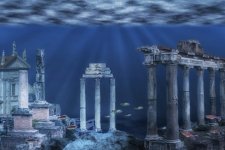Menu
Install the app
How to install the app on iOS
Follow along with the video below to see how to install our site as a web app on your home screen.
Note: This feature may not be available in some browsers.
You are using an out of date browser. It may not display this or other websites correctly.
You should upgrade or use an alternative browser.
You should upgrade or use an alternative browser.
Greek History Community
What is the myth of Santorini and Atlantis?
- Thread starter greek_ggirl
- Start date
1 - 3 of 3 Posts
dpappas87
Active member
This story shared some elements with the myth of Atlantis, and there are those who believe that the mythological city of Atlantis that Plato wrote about, and that has been romanticized over the centuries, is actually the portion of Santorini that sunk to the bottom of the sea after the volcano erupted.
k_tsoukalas
Administrator
If you find yourself in Santorini you can check out this museum to learn about it!

 www.greekboston.com
www.greekboston.com

Experience the Lost Atlantis Museum in Santorini
Visit the Lost Atlantis Museum while in Santorini, Greece.
1 - 3 of 3 Posts
JOIN THE DISCUSSION AND READ OTHER GREEK INFO:
Story of the Birth of Democracy
- axariotisxy
- Greek History Forum
- Replies: 1
I just watched a nice documentary about the birth of democracy in Athens. This is so fascinating! I didn't realize the nuances, only the basics about how it began in Athens. This documentary goes into a lot more detail.
Studying the Trojan War - Was it Real?
- d_kakavouli
- Greek History Forum
- Replies: 1
Did the Trojan War really happen? I am doing a bit of research and wanted to know what you guys thought:
The war is believed to have happened around 1200 BCE, and while there is no concrete evidence to support its occurrence, it is widely accepted as factual.
What is confusing me is how prevalent it is in Greek Mythology. In addition to the gods' involvement in the conflict, various stories and legends were added over time to give the tale more depth and drama. For example, the character of Achilles was said to be invulnerable except for his heel, which led to the phrase "Achilles heel" being used to describe a person's one weakness.
While some scholars once dismissed the Trojan War as pure myth, modern archaeological evidence has suggested that it may have been a real event. Excavations at the ancient site of Troy have revealed evidence of a long period of conflict and destruction, and historians have found similarities between the tale as it is told in ancient texts and what is known about the region's history at the time. While many details of the Trojan War are still shrouded in mystery, it seems increasingly likely that it was not just a legend but a real event that has been passed down through the ages.
The war is believed to have happened around 1200 BCE, and while there is no concrete evidence to support its occurrence, it is widely accepted as factual.
What is confusing me is how prevalent it is in Greek Mythology. In addition to the gods' involvement in the conflict, various stories and legends were added over time to give the tale more depth and drama. For example, the character of Achilles was said to be invulnerable except for his heel, which led to the phrase "Achilles heel" being used to describe a person's one weakness.
While some scholars once dismissed the Trojan War as pure myth, modern archaeological evidence has suggested that it may have been a real event. Excavations at the ancient site of Troy have revealed evidence of a long period of conflict and destruction, and historians have found similarities between the tale as it is told in ancient texts and what is known about the region's history at the time. While many details of the Trojan War are still shrouded in mystery, it seems increasingly likely that it was not just a legend but a real event that has been passed down through the ages.
My Top Favorite Greek Philosophers
- paharo45
- Greek History Forum
- Replies: 1
There are too many philosophers to count, but these are the ones I am studying at the moment. It's fascinating to me how influential the Greek philosophers are. Here's some things I am learning:
#1 Socrates
If philosophy had a poster boy, Socrates might very well be it. The father of Western philosophy, Socrates was a gadfly to Athenian society, questioning everything and Master to Plato. Known for the Socratic Method and his unflinching commitment to truth, Socrates' influence is immeasurable despite never having written a word.
#2 Plato
Rightly succeeding his mentor on this list, Plato's Academy saw him birth the first "university" of its kind. His unabashed idealism, immortal Forms, allegories like the Cave, and the pursuit of 'The Good' in moral philosophy set the stage for much intellectual discourse.
#3 Aristotle
Aristotle, another of Plato's students, had a more grounded approach to philosophy than his predecessor. With establishing principles of logic and reason, and contributions to virtually every field of academia, from poetry to physics, Aristotle's body of work remains foundational.
#4 Heraclitus
Heraclitus, famed for the idea that "change is the only constant," viewed the cosmos through a lens of process, flux, and an everlasting Logos that governs the world. Although little of his work survives, his influence on ancient and modern thinkers is profound.
#5 Epicurus
Known for his eponymous philosophy, Epicurus taught that the greatest good is to seek modest pleasures in order to attain a state of tranquility, freedom from fear (ataraxia), and absence of bodily pain (aponia). Often misunderstood, Epicureanism is starkly different from the modern use of 'epicurean' - it's much less about a luxury lifestyle and more about ethical considerations regarding personal fulfillment.
#1 Socrates
If philosophy had a poster boy, Socrates might very well be it. The father of Western philosophy, Socrates was a gadfly to Athenian society, questioning everything and Master to Plato. Known for the Socratic Method and his unflinching commitment to truth, Socrates' influence is immeasurable despite never having written a word.
#2 Plato
Rightly succeeding his mentor on this list, Plato's Academy saw him birth the first "university" of its kind. His unabashed idealism, immortal Forms, allegories like the Cave, and the pursuit of 'The Good' in moral philosophy set the stage for much intellectual discourse.
#3 Aristotle
Aristotle, another of Plato's students, had a more grounded approach to philosophy than his predecessor. With establishing principles of logic and reason, and contributions to virtually every field of academia, from poetry to physics, Aristotle's body of work remains foundational.
#4 Heraclitus
Heraclitus, famed for the idea that "change is the only constant," viewed the cosmos through a lens of process, flux, and an everlasting Logos that governs the world. Although little of his work survives, his influence on ancient and modern thinkers is profound.
#5 Epicurus
Known for his eponymous philosophy, Epicurus taught that the greatest good is to seek modest pleasures in order to attain a state of tranquility, freedom from fear (ataraxia), and absence of bodily pain (aponia). Often misunderstood, Epicureanism is starkly different from the modern use of 'epicurean' - it's much less about a luxury lifestyle and more about ethical considerations regarding personal fulfillment.
Learning about the Spartan way of life
- dimi_pat
- Greek History Forum
- Replies: 1
I find the Spartans fascinating. They seemed to have a different way of life!
The Spartans, known for their military might, also led a lifestyle that was remarkably disciplined and focused on simplicity.
The core of Spartan society was its military-oriented ethos. From a young age, Spartan boys were trained to be soldiers in the agoge, a rigorous education system that emphasized physical training, endurance, and survival skills. This preparation was not just about warfare but about creating individuals who were resilient, self-sufficient, and disciplined.
But Spartan discipline extended beyond the military sphere. Spartans lived a life of austerity and frugality that is quite alien to our modern way of living. Meals were simple, homes were unadorned, and luxuries were frowned upon. This was not out of a lack of resources but a deliberate choice to avoid softness and dependency on material comforts.
Interestingly, this Spartan simplicity also fostered a sense of equality among citizens. By eschewing luxury, Spartans aimed to reduce divisions within their society. Wealth and status were downplayed, while military prowess and moral integrity were valued above all.
What do you guys think about this or what can you add to my thinking?
The Spartans, known for their military might, also led a lifestyle that was remarkably disciplined and focused on simplicity.
The core of Spartan society was its military-oriented ethos. From a young age, Spartan boys were trained to be soldiers in the agoge, a rigorous education system that emphasized physical training, endurance, and survival skills. This preparation was not just about warfare but about creating individuals who were resilient, self-sufficient, and disciplined.
But Spartan discipline extended beyond the military sphere. Spartans lived a life of austerity and frugality that is quite alien to our modern way of living. Meals were simple, homes were unadorned, and luxuries were frowned upon. This was not out of a lack of resources but a deliberate choice to avoid softness and dependency on material comforts.
Interestingly, this Spartan simplicity also fostered a sense of equality among citizens. By eschewing luxury, Spartans aimed to reduce divisions within their society. Wealth and status were downplayed, while military prowess and moral integrity were valued above all.
What do you guys think about this or what can you add to my thinking?
Greek Independence Day History
- redsoxdw_
- Greek History Forum
- Replies: 1
Greek Independence Day is coming up! I thought I would share a bit that I know about the history. Please chime in with corrections or anything to add!
- The Spark of Revolution: Greek Independence Day marks the day in 1821 when the Greeks began their revolt against the Ottoman Empire, a state that had controlled Greece for nearly 400 years. This revolt was influenced by the surge of nationalism throughout Europe and inspired by the Enlightenment ideals of liberty, equality, and fraternity.
- A Poet’s Declaration: The revolution officially began after Bishop Germanos of Patras raised the Greek flag at the Monastery of Agia Lavra in Peloponnese, symbolizing the call to arms. However, it was rumored that the war of independence was actually declared a few days earlier by Alexandros Ypsilantis, a Greek national hero, in the Danubian Principalities.
- International Support: The Greek fight for independence was not just a local effort; it garnered substantial international support from prominent figures such as Lord Byron from Britain, who notably spent his own money and later died in Greece, contributing to the Greek cause. This international backing was crucial for the morale of the Greek fighters and helped in diplomatic efforts later on.
- The Battle of Navarino: A pivotal point in the Greek War of Independence was the Battle of Navarino in 1827, where the combined fleets of Britain, France, and Russia defeated the Ottoman and Egyptian fleets. This naval battle marked a significant turning point that led to the eventual independence of Greece.
- Recognition and Autonomy: Greek Independence was formally recognized in 1830 by the Treaty of London. However, full sovereignty and the delineation of the Greek borders were not achieved until later. It allowed the foundation of the modern Greek state, under the governance of King Otto from Bavaria.
Share and discuss Greek history!
WorldwideGreeks.com is a free online forum community where people can discuss Greek food, travel, traditions, history and mythology.
Join Worldwide Greeks here!
Join Worldwide Greeks here!
JOIN COMMUNITY FOR FREE
LOGIN TO YOUR ACCOUNT



